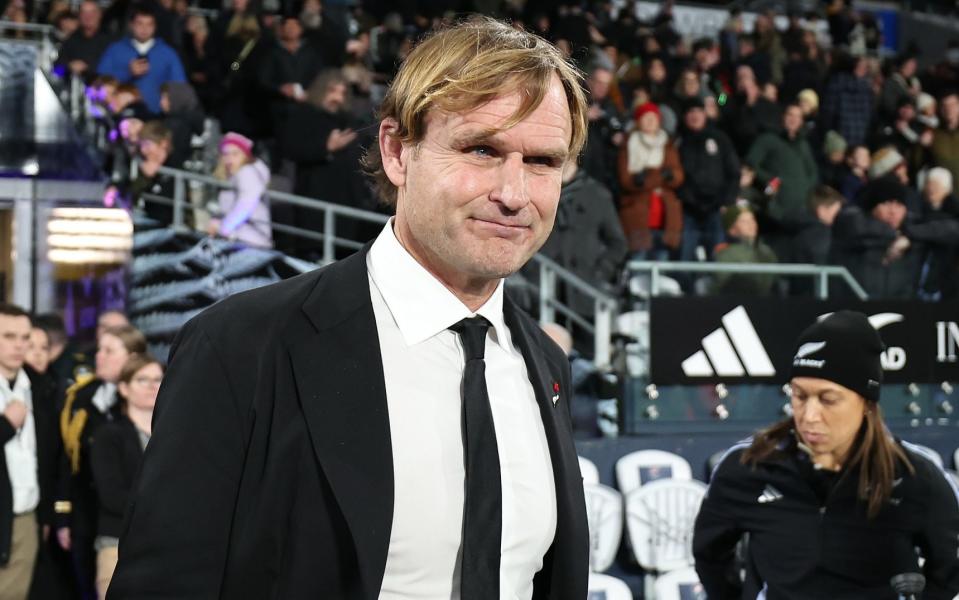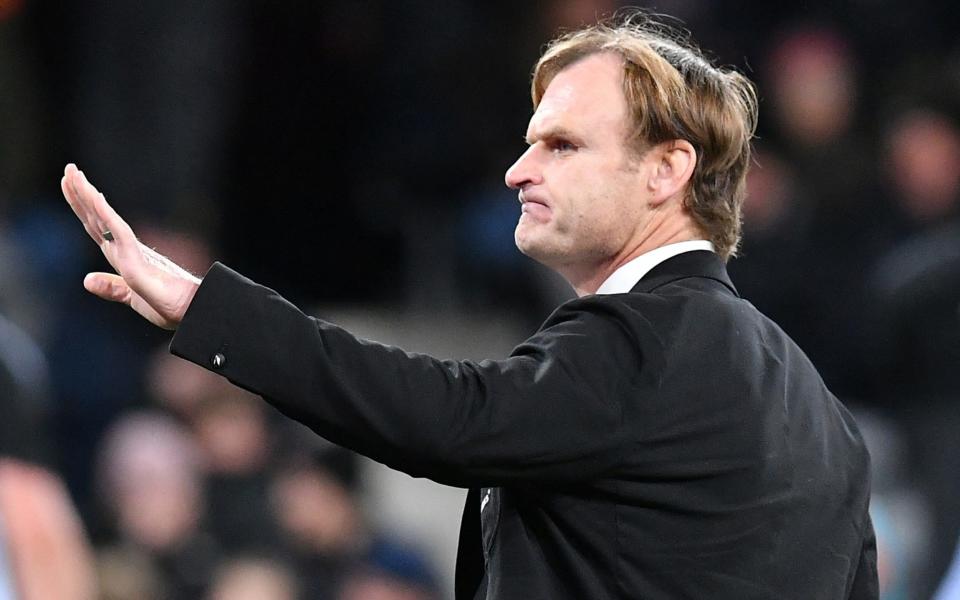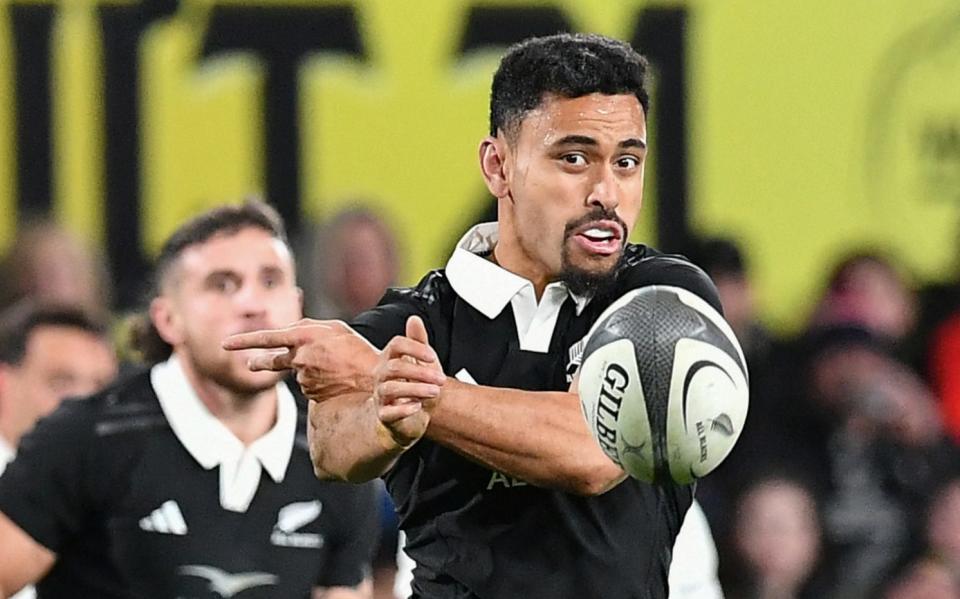Scott Robertson’s tactical nous and personality made for an interview masterclass

Rugby union seems to have two distinct types of fan: obsessive tragics and curious casuals.
The latter can evolve into the former, because it is a sport that can grasp you in several ways, with tactical and technical nuances or via more visceral means, thanks to the physical and emotional commitment demanded of players.
Scott Robertson’s first post-match interview as head coach of the All Blacks slapped into a small sweet spot. Everyone would have been enchanted.
In the wake of an edgy 16-15 triumph, Robertson spoke to Sky New Zealand, a network that is not renowned for neutrality. Mils Muliaina, the side’s former full-back, is among the more reserved pundits. His pre-match verdict a couple of hours previously? “I think the All Blacks will win, but it’s going to be a tough one… I think they’ll win by 12.”
Very quickly, when Robertson took the microphone, it became clear that New Zealand had respected England’s potential to rattle them and prepared accordingly. His opening gambit was a self-deprecating nod to the tension at the finale of the first Test.
Robertson admitted that his own work with performance psychiatrist Dr Ceri Evans, presumably in a bid to stay calm under pressure, had “gone out the window” when Damian McKenzie was timed out of a shot at goal and the hosts shipped another penalty. A flash of humanity.
Following on from Sir Graham Henry, Steve Hansen and Ian Foster – three rather serious figures, albeit each equipped with a dry sense of humour – ‘Razor’ was always going to be different. Even without considering his penchant for surfing and breakdancing, the 49-year-old appears to be a gregarious charisma machine.

The top-line verdict from Robertson was concise. “Just before half-time, I thought we were all over them and then we got into an arm wrestle and they just wouldn’t let us out of it,” he said.
Kieran Read, the iconic All Blacks No 8 and an excellent contributor to the broadcast, wondered why the last pass was not sticking. Robertson praised England’s “scramble D” and pointed out that the tourists had played six matches in 2024 before the weekend.
‘Fair play to England’
Then came a fascinating few seconds, as Sir John Kirwan enquired about the intricacies of the England blitz. This was Robertson’s cue to heap praise on Felix Jones, and to emphasise how his own backroom team had done their homework.
“Aw, we’ve seen it for the last six games,” he added of England’s aggressive approach without the ball, which often saw Immanuel Feyi-Waboso and George Furbank hurtling into midfield to hunt heavy tackles.
“Their defence coach [Jones] has come in and he wants to land on you. He wants to create that turnover. He wants [to tackle] you outside-in, blind-spot as you’re catching the ball.
“They’d rather give you a two-man overlap and go and get you than get there early. You’ve got to be brave, but you’ve got to be smart. We tried to get an extra man and that second pair of hands, just to take the pressure off. But we just didn’t execute enough.”
Read chimed in here. Did the All Blacks think about more kick-passes, such as the perfectly weighted strike from McKenzie that produced Sevu Reece’s try?
“We did… but because the kick-pass comes off the first [pair of] hands, [the defenders] can turn,” Robertson replied. “It has to be off the second [receiver], but the second didn’t have time. We’re getting very technical here, aren’t we? But fair play to [England]. They’re hard, well-drilled. It was a game of moments.”
Shrewd and magnanimous, Robertson was also showing vulnerability in a different way. Such insight, though generous, is not so revealing as to damage New Zealand’s prospects for the second Test at Eden Park. And yet, it was jarring for its rarity.
Robertson helped by fact his decisions paid off
Frankly, almost all coaches are capable of similarly detailed answers. However, they often prefer to lean on banal generalisations, seemingly through a desire to keep cards close to their chests. Curt chats are always a shame, because coaches can use them to enlighten and educate the audience, not to mention seize the opportunity to rationalise their own strategies and selection calls.
Now, Robertson was at an advantage. He had not been probed about a contentious refereeing decision. He was speaking in the afterglow of a hard-fought win, which had been shaped by some of his decisions; the one to start Stephen Perofeta, for instance, as well as when he intervened to introduce Beauden Barrett from the bench.

As the man himself has acknowledged, inevitably trickier patches will present unfamiliar challenges. TJ Perenara’s knee injury, compounding the retirement of Aaron Smith and the absence of Cameron Roigard, means the All Blacks are particularly thin at scrum-half. England will come again in Auckland. New Zealand losing there, for the first time in 30 years, could puncture the good will and make for a more awkward interrogation.
Still, you sense Robertson will stay true to himself. He finished his Sky New Zealand chat with some shorter responses. Scott Barrett, his skipper, received special praise: “He just keeps going… he’s like a NASCAR.” Maro Itoje was hailed as “probably the best operator in the world” in the field of line-out disruption.
Robertson conceded that he was still learning that “the result is all that matters” in the Test arena. Jason Ryan, his forwards coach, was credited with the scrummaging display: “Mate, how good?”
Authenticity and affability were hallmarks of Robertson’s demeanour as he built his Crusaders dynasty. They were palpable here. At one stage, the new All Blacks head coach puffed out his cheeks and widened his eyes, evidently absorbing waves of adrenaline. He was unafraid to exhibit pure relief.
Rival honchos may not be able to replicate his delivery, but, with media messaging an essential pillar of the job description, they would do well to study Robertson’s interview. Because it will have won hearts and minds.

